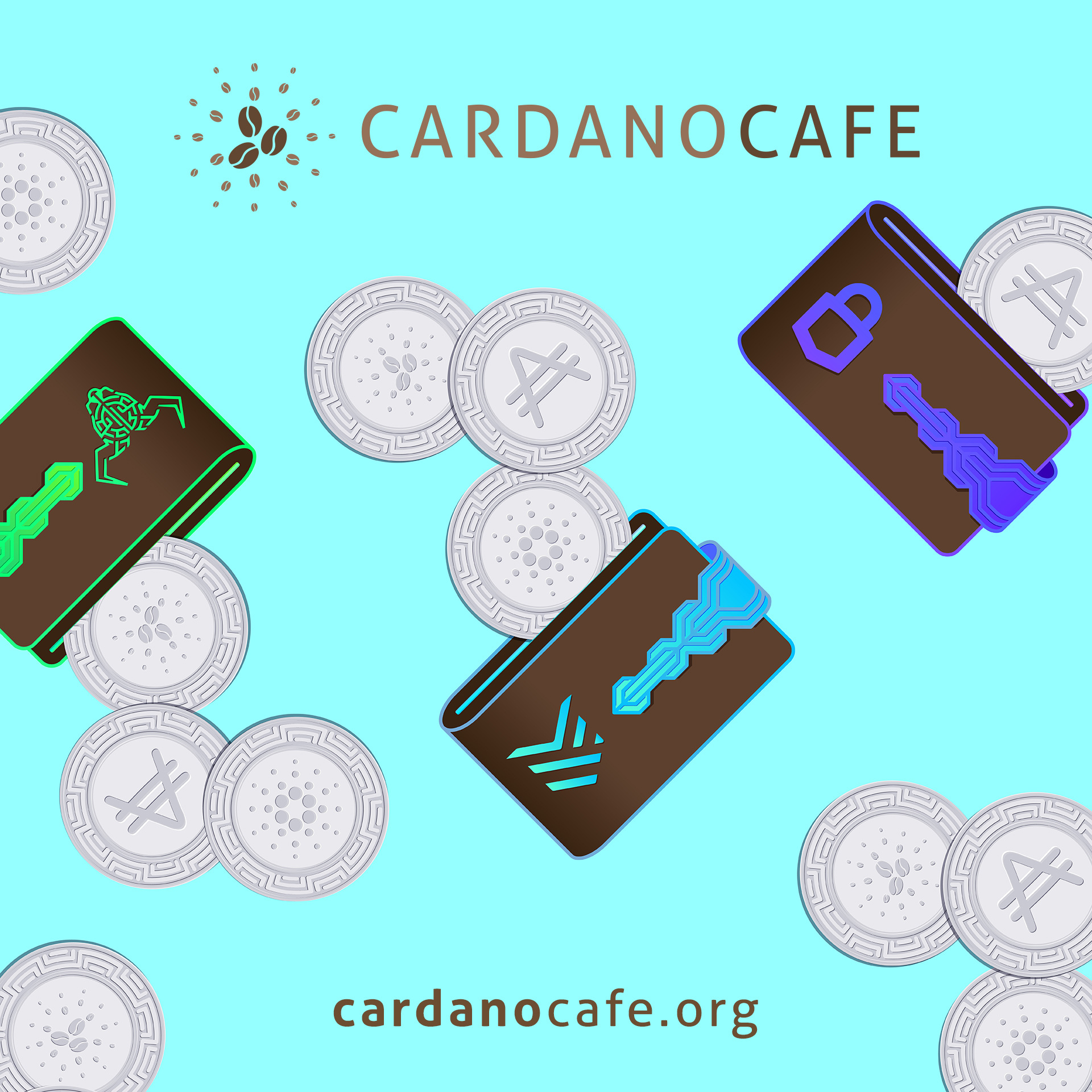
Knowledge Base
We all know that the first rule and priority of the cryptocurrency world is to keep our tokens safe and secure. Any good crypto wallet enables the sending and receiving of tokens, but Since Cardano is based on a delegated Proof Of Stake protocol, the next most important consideration is which wallet simultaneously gives you the ability to delegate your Ada to a Stake Pool of your choice. Choosing the right wallet for your purposes is similar to choosing a Stake Pool that best matches your goals and self determined principles.
We all know that the first rule and priority of the cryptocurrency world is to keep your tokens safe and secure. Any good crypto wallet enables the sending and receiving of tokens, but Since Cardano is based on a delegated Proof Of Stake protocol, the next most important consideration is which wallet simultaneously gives you the ability to delegate your Ada to a Stake Pool of your choice. Choosing the right wallet for your purposes is similar to choosing a Stake Pool that best matches your goals and self determined principles. There are more than 2500 Stake Pools to choose from. Cardano wallets all share some common traits, but only you can determine the role you want your wallet to fulfill as it relates to your inclusion in the Cardano ecosystem. Fortunately, there are a lot of excellent choices to consider.
Sending, receiving, and staking Ada are the essential functions of any good Cardano wallet. It is important to note that there are both Hot and Cold wallets that enable staking. Hot wallets are connected to the internet in varying ways and degrees. There are Desktop wallets, Mobile wallets, Web browser based wallets, browser extension wallets, and just recently there is a new wallet that was programmed into a browser from scratch rather than added on to it. Cold wallets are typically hardware devices.
There are numerous opinions in both directions regarding which type of wallet is the most secure, and once again that is a decision that each Ada holder must make for themselves. One common point that everyone agrees upon is that it is not best in regard to the common sense of decentralized cryptocoins to leave your Ada residing on a centralized exchange. However, in spite of all the "not my key, not my crypto" posturing that is rampant across the crypto space, and as secure as hardware wallets are known to be, it is also possible to hack into individual hardware devices, not easy to do, but it has been done. Consequently there are different considerations which apply to the different types of wallets which must be taken into account. Some Cardano community members prefer the multi-layered security that a third party company offers or the multi-layered secutity that poplular trading sites like Coinbase, or Gemini offer.
In researching this subject I encountered a vast body of information as the number of wallets of different types have proliferated rapidly in the last two years. Therefore, in this post I am going to focus on the three main Cardano wallets featured on the Cardano website itself: Daedalus, Yoroi, and Ada Lite, and then address hardware wallets and other Cardano friendly wallets in two additional posts.
I am particularly fond of the original native Daedalus desktop wallet which is the official full node wallet of Cardano. The Cardano website wallet page states, "Daedalus downloads a full copy of the Cardano blockchain and independently validates every transaction in its history. That way you get maximum security and completely trustless operation without centrally hosted 3rd party servers." Participation in the Cardano community is vitally important to me, and it is directly associated with the delegation my Ada to Cafe 2 and earning rewards every epoch of five days. Personally it makes me happy to see my delegated Ada earning more Ada for me. Additionally, keeping my Ada under my own control is vitally important to me too, and I am pleased, (but totally mystified), to see my Ada residing safe and sound in my Daedalus wallet while somehow earning rewards while being delegated to Cafe 2. I have had a Daedalus wallet since I acquired my first Ada five years ago. The first generation Daedalus wallet was Byron, and the current generation is Shelley which enabled delegation and staking. As a full node wallet Daedalus offers delegation and staking as well as voting rights through the Catalyst system. For me it is cool to be part of the Cardano ecosystem and to have access to everything that Daedalus offers, including the Newsfeed. The latest upgrade of the Daedalus interface even shows you when a new block is being added to the chain. The Cardano website specifically states that a minimum of 16GB of RAM is necessary now due to the growth of the blockchain and the number of use cases. I prefer Daedalus as it is an IOHK product and it is secured by the Cardano blockchain. I only learned recently that I can choose between six different themes for my Daedalus interface, I went with a nice light blue theme.
A full node wallet might not be best for you if you prefer to stake and earn rewards without having to connect to the Cardano blockchain and participate in the validation process . Yoroi is an Emurgo product/wallet that enables the sending, receiving, and staking of your Ada, but it is not a full node wallet. However, it does enable Catalyst voting eligibility, therefore it offers a pretty complete user experience. It is described as a "one click install" via a Chrome extension. The Yoroi website states: "Yoroi is a light wallet for Cardano. There is no need to download the blockchain when you open the wallet." It also states that private keys are encrypted and never shared with third parties. Yoroi emphasizes security and dependability, and privacy is protected to a point where Yoroi does not even process analytics. Yoroi is programmed in Rust, a systems programming language that "runs quickly and guarantees thread safety." Yoroi uses Node.js, an open source Javascript runtime environment that is cross-platform and executes JavaScript code outside the browser. In keeping with the idea of maintaining control of your Ada, Yoroi allows you to delegate and stake without surrendering your Ada to the Stake Pool of your choice. Yoroi supports Ada and Ergo.
Ada Lite is a different animal altogether from Daedalus and Yoroi. It was initially developed by VacuumLabs, a group of Slovakian programmers in 2017 as a beginner-friendly Cardano wallet for their own Ada during the early stages of Cardano's launch. At that time Cardano was a new and primarily undocumented blockchain, and there was no welcoming guidance for outside developers interested in building upon it. Ada Lite became one of the most successful spinoff companies within the Vacuum Labs group. The original intention was to offer a light wallet that made interacting with the Cardano blockchain intuitive and easy for users. What I find interesting is that Ada Lite can be accessed through a Mnemonic passphrase, an encrypted .JSON Key file, or different hardware wallets that are connected to the Ada Lite site. You can send, receive, and delegate your Ada without surrendering control with the Ada Lite interface. If you have a hardware wallet you can connect your Trezor, or Ledger, or Ellipal to the Ada Lite interface and manage your transactions directly from the device itself.
As I said above, I have had the evolutions of the Daedalus desktop full node wallet right from the start of my involvement with Cardano and Ada, but there are quite a few wallets that do all the right things for you without being a full node. I will address the Hardware wallets that are popular for sending, receiving, and delegating/staking Ada in the next post on this subject.

|
written by: Eric Hill published at: Feb 11, 2022
|

Knowledge Base
Dec 3, 2023, by Eric Hill

Knowledge Base
Sep 7, 2023, by Eric Hill

Knowledge Base
Apr 9, 2023, by Eric Hill

Knowledge Base
Mar 22, 2023, by Eric Hill

Knowledge Base
Oct 22, 2022, by Eric Hill